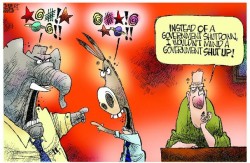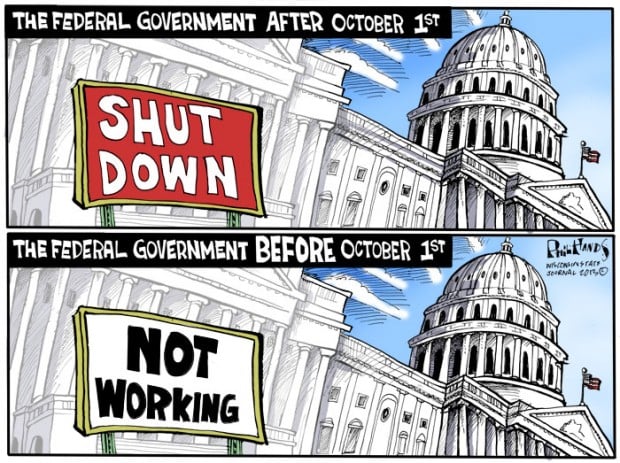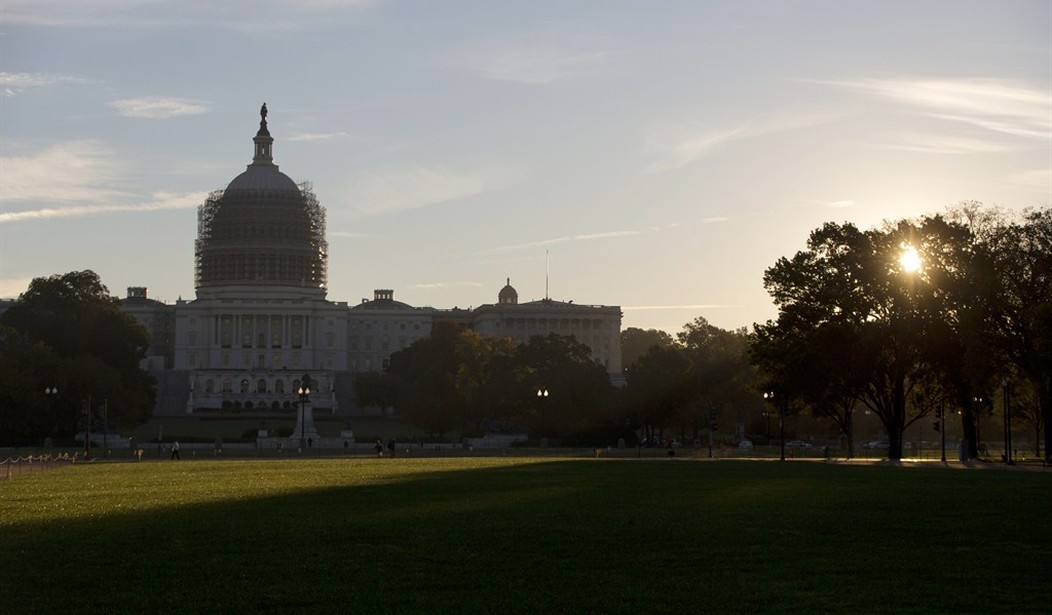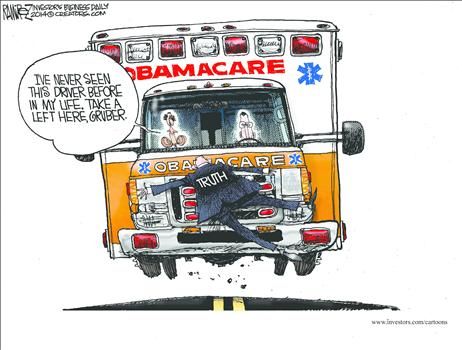A couple of days ago, I wrote that Republicans should not be intimidated if the White House threatens a government shutdown.
Simply stated, prior shutdowns have yielded meaningful policy victories without causing measurable political damage.
 This isn’t to say that the goal of any fiscal fight is a shutdown. Instead, my point is simply that Republicans shouldn’t strengthen the bargaining position of the White House by announcing that they will do whatever it takes to avoid a government shutdown.
This isn’t to say that the goal of any fiscal fight is a shutdown. Instead, my point is simply that Republicans shouldn’t strengthen the bargaining position of the White House by announcing that they will do whatever it takes to avoid a government shutdown.
This shouldn’t be a controversial assertion.
For instance, Obama could threaten that he won’t sign a spending bill unless Republicans agree to a top tax rate of 90 percent.* Do Republicans acquiesce to that demand?
Or what if the President says he will veto spending legislation if it doesn’t include nationalization of the oil industry. Or expanded Obamacare. Should the GOP say yes?
 Based on the no-shutdown-for-any-reason rule, Republicans would have to surrender to these hypothetical demands. I’ve called this the “French Army” approach to budget policy since Obama always wins.
Based on the no-shutdown-for-any-reason rule, Republicans would have to surrender to these hypothetical demands. I’ve called this the “French Army” approach to budget policy since Obama always wins.
But that won’t happen. I’m guessing 90 percent-plus of GOP politicians and GOP-friendly pundits would agree that a line should be drawn in the sand based on the extreme examples I provided, even if it means a shutdown of the government because Obama vetoes a spending bill that doesn’t include those provisions.
In other words, Republicans presumably don’t actually believe in the no-shutdown-for-any-reason rule. Instead, they are simply signalling that they don’t think it makes sense to have a shutdown fight based on the fights that are likely to occur in the near future.
Instead, they are simply signalling that they don’t think it makes sense to have a shutdown fight based on the fights that are likely to occur in the near future.
Recommended
But that creates a problem for the GOP. In the short run, it means the White House gets to unilaterally grant amnesty to certain illegal aliens. More important (at least from my perspective as a fiscal policy wonk), it gives Obama the upper hand in battles that may take place next year over issues such as spending caps and Obamacare funding.
To their credit, Republican leaders recognize the problem, so they’re searching for a strategy that would achieve their objectives without a government-wide shutdown.**
A story in Politico lays out their most recent maneuvering.
Republican leaders have intensified their planning to prevent a government funding showdown, weighing legislative options that would redirect GOP anger at Barack Obama’s expected action on immigration and stave off a political disaster, according to sources involved with the sessions. …Speaker John Boehner, Senate Minority Leader Mitch McConnell and their top aides and deputies are mulling several options that would give Capitol Hill Republicans the opportunity to vent their frustration with what they view as an unconstitutional power grab by the White House — without jeopardizing the government financing bill. The options include…passing two separate funding bills — a short-term bill with tight restrictions on immigration enforcement agencies, and another that would fund the rest of the government until the fall.
I’m tempted to grouse about the reporter’s bizarre claim of “political disaster” for the GOP. After all, the recent mid-term elections were a huge victory for Republicans.
But let’s instead focus on the idea of having two spending bills, one that funds 99 percent of the government, presumably without controversy, and one that funds – with controversial restrictions – the relatively tiny parts of government that deal with immigration enforcement.
The story continues, pointing out that some sort of fight is inevitable.
…what exactly Republicans can do outside of the funding process to stop Obama remains an open question. Even if they had enough votes to pass a stand-alone bill, it would almost certainly be vetoed by Obama — and the GOP would likely lack the votes to overturn it.
So does this mean part of the immigration bureaucracy would be shut down for the rest of the fiscal year?
Presumably not, though it’s unclear whether Obama or Congress would have any incentive to compromise and strike a deal.
Regardless, some pundits like this potential strategy for the GOP. Ramesh Ponnuru,writing for Bloomberg, thinks it puts pressure on the Democrats.
Why not try to pass a funding bill that pays for all of the operations of the federal government except for Citizenship and Immigration Services, the agency in the Homeland Security Department that would carry out Obama’s order? They could then try to pass another bill that just funds that agency — but with a restriction saying no money can be used for the president’s amnesty. What would the Democrats do then? If they block a big funding bill that has nothing to do with immigration over the issue, it becomes hard to deny that they’re the ones shutting down the government to get their way. If they don’t block it, they’ll have no government shutdown to complain about — and the parties could move on to a more narrowly focused fight about the immigration budget.
And in a column for the Washington Examiner, Byron York also seems favorable toward the strategy.
…in January, with the GOP in control — and, presumably, Obama’s edict in hand — Republicans will work on crafting a new spending measure that funds the entire government, with the exception of the particular federal offices that will do the specific work of enforcing Obama’s order.
Byron assumes that Obama will sign the big bill that funds almost everything and then fight about the mini-bill funding the small part of the Department of Homeland Security that deals with immigration enforcement.
…the president will veto it. At that point, a shutdown battle could occur — but it would be a battle over shutting down the small part of the federal government tasked with enforcing the immigration order. Everything else would remain up and running.
So is this a successful approach, one that not only can derail Obama’s executive amnesty but also could be used for next year’s fiscal battles?
I’m not as confident as Ramesh and Byron for the simple reason that (if he asked me) I would tell Obama to veto the bill that funds 99 percent of the government and justify his actions by stating that he “won’t be blackmailed” by Congress.
 Ramesh correctly points out in his column that the resulting shutdown won’t be the fault of Republicans, but will that be apparent to voters? Particularly in the midst of a battle when the establishment press will be acting as an echo chamber for White House talking points?
Ramesh correctly points out in his column that the resulting shutdown won’t be the fault of Republicans, but will that be apparent to voters? Particularly in the midst of a battle when the establishment press will be acting as an echo chamber for White House talking points?
Maybe I’m wrong, but a government-wide shutdown seems like the most effective strategy for Obama. He won’t be asking my opinion, of course, but I’m sure he has plenty of advisers who would reach the same conclusion about how to proceed.
Which means that Republicans ultimately will have to decide whether they have any policy preferences that are sufficiently important that they’re willing to fight for them even if Obama forces a shutdown.
It’s a judgement call, and here are two examples to illustrate why you shouldn’t tilt at windmills and launch suicide missions, but also why you shouldn’t unilaterally disarm.
Example #1: The Department of Education should be abolished, a goal that theoretically could be largely achieved by not appropriating any funds when spending bills are put together in 2016, though it certainly would lead to a shutdown fight beginning about one month before the presidential election.
Example #2: The debt limit fight of 2011 produced some much-needed spending caps and sequester enforcement, but the White House is very opposed and may be so committed to undoing those policies and expanding the size of government that it forces a shutdown fight next year.
Looking at these options, even a curmudgeonly libertarian such as myself won’t be urging lawmakers to have the shutdown fight in Example #1.
However, I’m hoping that establishment GOPers will show a similar blend of principle and pragmatism by being willing to have the fight with Obama outlined in Example #2.
by being willing to have the fight with Obama outlined in Example #2.
*Spending bills (known as appropriations bills inside the beltway) technically are not supposed to include the types of policy changes used in my examples, but Obama could say he won’t sign a spending bill if there isn’t accompanying legislation to accomplish one of more of the listed objectives. Or he could even demand that a spending bill include language stating that a certain amount of money should be dedicated to a particular bureaucracy for purposes of achieving a specific policy.
**One surreal part of this debate is that “shutdown” is a somewhat misleading term since most of the government (the military, air traffic control, etc) actually continues to operate.
P.S. I’ve already shared some amusing video, commentary, and cartoons about “Grubergate.”
Well the folks at American Commitment have put together a highlight video for your enjoyment.
And here are some Grubergate cartoons. We’ll start with one from Robert Gorrell.
Michael Ramirez is in fine form as usual.
Here’s one from Dana Summers.
Eric Allie has an amusing addition to our collection.
Henry Payne also gets in a good jab.
Last but not least, Chip Bok nicely captures the attitude of Washington DC.
These are all funny cartoons, but you know who’s laughing the hardest right now?
The answer is Jonathan Gruber, because he got about $6 million of our money as part of insider contracts from government.
In other words, I wasn’t kidding when I wrote that Obamacare is a get-rich-quick scheme for the political elite.
Just another example of how big government enables sleazy corruption.































Join the conversation as a VIP Member